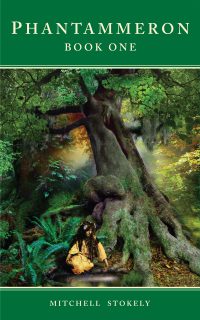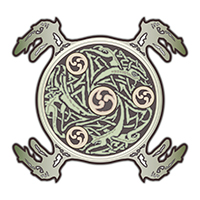*The following is an excerpt taken from the back of my new book, Phantammeron Book One. I discuss the origins of the names used in the first book, how they were created, and why. The place names do evolve and get much more complicated as I move into later books. But they do retain some connection to several languages and races that I create in later Phantammeron fantasy novels. – M. Stokely
Introduction
Most of the languages and names used in the Phantammeron were based on a casual study of the Insular Celtic languages of Ireland and the British Isles (Irish Gaelic, Welsh, etc.). However, in researching ancient languages, I found I was often more interested in their appearance in ancient Indo-European philology and fairy tales than in the more general study of linguistics and the construction of artificial fantasy languages from them.
Many of the fantasy names used in my books originally used elaborate accents, umlauts, etc. to guide the reader in their correction pronunciation. But after careful consideration, I removed them in an attempt to simplify the words and avoid printing errors. In my notes, however, exist my original word designs, accents, and inflections. The new names were then redesigned to make them as easy and as intuitive as possible for the reader to pronounce. It was then my hope that newer words constructed from earlier forms would use rules the reader could easily understand and build upon, deriving meaning from more complex names built from various roots and stems. In that sense, I tried to build languages in my current books using ordered constructs that readers could easily build on in pronouncing words used in future Phantammeron books. But I also wanted readers to sense their hidden meaning, and find deeper connections between the characters, places, and events these names represented.
Because the Phantammeron books represent a written mythological history spanning a great deal of time, the names used in Book One had to be loosely constructed from future languages that evolved in later books (for example, the world of Anatar). Yet, as Book One covers the initial cosmology of the Phantammeron series, primitive names given to early divine places and beings in it had to form the basis for more complex derivative names used in later books, as well. This pattern, I felt, reflected how ancient mythological names have been used in our modern world. For that reason, the simpler names used in Book One were carefully designed to fit a more ordered mythology and comprehensive evolution in both their meaning and influence over later languages, stories, characters, and books of the Phantammeron, even though those languages and the races that used them had yet been born.
But it is still my hope that you will find more value in the hidden spiritual meaning, inner connections, and carefully constructed purpose of these languages in representing the often irrational, spiritual, and emotional nature of the mythopoeia found in the Phantammeron, and less value in attempting to portray the ordered and coldly logical artifice of fantasy linguistics and language construction.
Core Pronunciations
I have included some core elements from the various names used in the Phantammeron, which should help you in their pronunciation in this book and later ones.
a – most often a soft ‘ah’ in sound, as in Ana (‘ah-nah’)
c – almost always the hard ‘k’ sound, as in Celebreava (‘kel-e-bray-ah-vah’)
ch – can be a traditional ‘ch’, as in Cromwich (‘krom-ich’), or hard ‘k’, as in Durnach (‘dur-nak’)
dd – same as ‘th’, as in Breddwyn (‘breth-win’)
i – often used as a hard ‘i’, as in ‘high’. Examples are Lilu (‘lie-loo’) and Iwu (‘eye-woo’). Use the ‘ee’ sound at the end of a word, as in safni (‘saf-nee’)
u – often ‘oo’ in sound, as in Koredlum (‘kor-ed-loom’)
w – more often pronounced as hard ‘w’. But sometimes silent, as in Cromwich (‘krom-ich’)
y – often pronounced ‘eye’ (hard ‘i’), as in Amandyas (‘ah-man-die-us’), but also soft, as in Avalyr (‘ah-vah-lir’)
aia – pronounced ‘eye-uh’ when at the end of a word
ea – pronounced ‘ay-uh’ when at the end of a word
ia – pronounced ‘ee-uh’ when at the end of a word
ua – pronounced ‘oo-uh’ when at the end of a word
Special Pronunciations
Phantammeron – pronounced as ‘fan-tam-ur-on’ (or like fant-hammer-on)
Phantaia – pronounced ‘fan-tie-yuh’ (same as Gaia)
Iwu – pronounced ‘eye-woo’
Uyl – pronounced ‘oo-il’
lyr – pronounced ‘lir’



